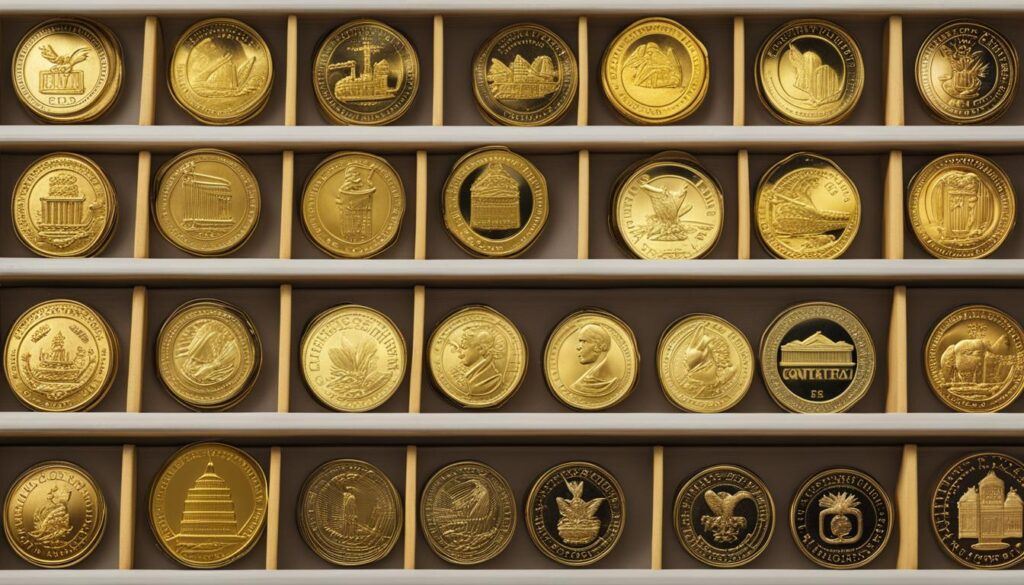Gold coins are often seen as a private and secure investment. Investors value their physical nature and the ability to hold and store them discreetly. But are gold coins really untraceable? Let’s explore the traceability of gold coins and the circumstances in which they can be subject to reporting.
Key Takeaways:
- Gold coins are not electronically traceable, making them an appealing option for those concerned about government surveillance.
- However, certain transactions involving gold coins can trigger reporting requirements under the Patriot Act.
- Transactions larger than $10,000 made using actual cash or cash instruments may require disclosure by a dealer.
- Personal checks, debits, bank wires, and credit card payments are not considered cash transactions and do not require reporting.
- The majority of gold coin transactions are conducted without reporting, with only a small fraction being subject to disclosure.
Anti-Money Laundering Provisions and Reporting
Under the anti-money laundering provisions of the Patriot Act, certain transactions involving gold coins may be subject to reporting. To trigger a disclosure requirement, the transaction must meet two conditions: it must be larger than $10,000 in size, and payment must be made using actual cash or cash instruments. Cash or cash instruments are defined as Federal Reserve notes, US coins (like pre-1933 gold coins), money orders, cashier’s checks, or traveler’s checks. Personal checks, debits, bank wires, and credit card payments are not considered cash or cash instruments and do not require reporting.
The IRS disclosure document for cash transactions meeting the conditions is known as Form 8300, and it applies to all cash transactions in the US economy, not just precious metals transactions. Money Metals Exchange, for example, has completed over 500,000 transactions and has filed Form 8300 fewer than ten times.

IRS Form 8300: Reporting Cash Transactions
For transactions involving actual cash or cash instruments that exceed $10,000, dealers are required to file Form 8300. This document is an IRS disclosure form that applies to all cash transactions in the US economy, not just those involving precious metals.
The purpose of Form 8300 is to help the government track and prevent money laundering and other illegal financial activities. By reporting these cash transactions, the government can identify any suspicious or potentially fraudulent activities.
To comply with the IRS requirement, dealers must collect the necessary information from the buyer and submit Form 8300 within 15 days of the transaction. The information includes the buyer’s name, address, social security number or taxpayer identification number, and the specific details of the transaction.
It’s important to note that reporting requirements for cash transactions exist for the protection of both dealers and buyers. By ensuring transparency in these transactions, the government can maintain the integrity of the financial system and detect any potential illegal activities.
Exceptions to Reporting
While certain cash transactions involving gold coins are subject to reporting, there are exceptions to these requirements. Personal checks, debits, bank wires, and credit card payments do not fall under the definition of cash or cash instruments and do not require reporting.
Additionally, it’s crucial to understand that the reporting requirement applies only to cash transactions larger than $10,000. Transactions below this threshold do not trigger the reporting obligation.
By understanding the reporting requirements and exceptions, buyers and sellers can navigate gold coin transactions while ensuring compliance with anti-money laundering provisions and maintaining their privacy.
| Reporting Obligation | Transaction Type | Reporting Limit | Required Reporting |
|---|---|---|---|
| Reportable | Cash or cash instruments | Over $10,000 | IRS Form 8300 |
| Not Reportable | Personal checks, debits, bank wires, credit card payments | N/A | N/A |
Cash Reporting Transactions
Cash reporting transactions play a crucial role in financial transparency and preventing money laundering. The reporting of cash transactions exceeding $10,000 is required by the Internal Revenue Service (IRS) to ensure accountability and compliance with anti-money laundering regulations. Let’s explore the official instructions for IRS Form 8300 and understand the related and exempt transactions.
Official Instructions for IRS Form 8300
The official instructions for IRS Form 8300 provide guidance on reporting cash transactions. According to these instructions, any person engaged in a trade or business who receives more than $10,000 in cash in a single transaction or in two or more related transactions must file Form 8300.
Related transactions refer to cash transactions that occur within a 24-hour period and where the recipient knows or has reason to know that they are connected. This requirement aims to prevent individuals from circumventing reporting obligations by conducting multiple transactions just below the $10,000 threshold.
General Instructions for Cash Transactions
Cash transactions include various forms of payment, such as cash itself, cashier’s checks, bank drafts, traveler’s checks, and money orders with a face amount of not more than $10,000. These forms of payment are considered to have immediate transferability and a high level of anonymity, making them susceptible to misuse.
On the other hand, personal checks, wire transfers, and money market withdrawals are not considered cash transactions and therefore do not require reporting under Form 8300.
Exempt Transactions
While cash reporting transactions are subject to scrutiny, there are exemptions that do not require reporting. For example, checks drawn on the payer’s own account are exempt from reporting, as they do not involve the same level of anonymity and potential misuse as cash transactions.
Certain foreign currency pieces are also exempt from reporting obligations, further promoting international financial flexibility.
Suspicious Transactions
In addition to the reporting requirements, Form 8300 includes a checkbox where recipients can indicate suspicious transactions. This allows businesses to bring attention to potentially fraudulent or illicit activities, assisting law enforcement agencies in their efforts to combat money laundering and other financial crimes.
It is important for businesses to exercise vigilance and report suspicious transactions, helping to maintain the integrity of the financial system and protect legitimate interests.
Cash Reporting Transactions Overview
| Transaction Type | Reporting Requirement |
|---|---|
| Cash | Must be reported if the transaction(s) exceed $10,000 |
| Cashier’s Checks, Bank Drafts, Traveler’s Checks, and Money Orders | Must be reported if the face amount does not exceed $10,000 |
| Personal Checks, Wire Transfers, and Money Market Withdrawals | Not considered cash transactions and do not require reporting |
Understanding cash reporting transactions and complying with the official instructions for IRS Form 8300 are vital for businesses and individuals involved in financial activities. By reporting cash transactions and remaining vigilant for suspicious activities, we contribute towards a more secure and transparent financial ecosystem.
Bank Reporting and Monetary Instrument Reports
When it comes to bank reporting, there are certain requirements that financial institutions need to adhere to in order to comply with cash reporting regulations. While personal checks may not be reported to the government, cash transactions exceeding $10,000 are subject to special scrutiny.
In these cases, banks are obligated to file a Cash Transaction Report (CTR) with the appropriate authorities. This report helps track large cash deposits and assists in preventing money laundering and other illicit activities. Individuals who deposit more than $10,000 in cash to any bank or financial institution account may also have their transactions reported.
Furthermore, when it comes to cashier’s checks and money orders, cash reporting may be triggered based on certain criteria. Banks are required to complete Monetary Instrument Reports (MIRs) or Monetary Instrument Logs for purchases of cashier’s checks with cash amounts between $3,000 and $10,000. The precise details surrounding the completion and filing of a CTR when an MIR is involved are not entirely clear, but it is likely that regular purchases of cashier’s checks between $3,000 and $10,000 would result in reporting.
In summary, banks play a crucial role in maintaining compliance with cash reporting requirements. Through the filing of CTRs and MIRs, financial institutions help ensure transparency and accountability in monetary transactions, ultimately contributing to the overall integrity of the financial system.

Summary of Bank Reporting and Monetary Instrument Reports
| Report Requirement | Description |
|---|---|
| Cash Transaction Report (CTR) | Required for cash transactions exceeding $10,000 |
| Cash Deposits | Deposits over $10,000 to any bank or financial institution account may be reported |
| Monetary Instrument Reports (MIRs) | Completed for cashier’s checks with cash amounts between $3,000 and $10,000 |
Reportable Sales and Criteria
When it comes to selling certain precious metals, it’s important to understand the reporting requirements that apply. The IRS mandates the filing of 1099-B forms for customer sales to dealers, ensuring transparency in precious metals transactions. Let’s take a closer look at the products subject to reporting and the quantity criteria that trigger these reporting obligations.
Products Subject to Reporting
For reportable sales, the following products fall under IRS scrutiny:
- 1 oz Gold Maple Leaf Coins
- 1 oz Gold Krugerrand Coins
- 1 oz Gold Mexican Onza Coins
- Any US coin composed of 90% silver
These products are commonly traded and require dealers to file the necessary reporting documentation.
Quantity Criteria for Reporting
The quantities that trigger reporting vary depending on the product being sold. Here’s a breakdown:
| Product | Quantities for Reporting |
|---|---|
| 1 oz Gold Maple Leafs | 25 or more in one transaction |
| 1 oz Krugerrands | 25 or more in one transaction |
| 1 oz Mexican Onzas | 25 or more in one transaction |
| American Gold Eagles | Not subject to reporting regardless of quantities |
| Fractional Ounce Gold Coins | Not subject to reporting regardless of quantities |
| Pre-1965 U.S. coins | Exact quantity threshold not clear; based on face value ($10,000), some dealers may report sales of $1,000 |
As you can see, sales of certain gold coins in quantities of twenty-five or more trigger reporting obligations, whereas American Gold Eagles and fractional ounce gold coins remain exempt from reporting, regardless of the quantities involved. The threshold for pre-1965 U.S. coins is not explicitly defined, but it is typically based on the face value of $10,000, with some dealers choosing to report sales of $1,000.
Understanding the reportable sales and associated criteria helps investors navigate the regulatory requirements while ensuring compliance with the IRS. By staying informed, precious metals investors can make informed decisions regarding their transactions and foster transparency in the market.

Purity Requirements for Reportable Sales
The purity or fineness of the precious metal plays a crucial role in determining whether a sale is reportable. When it comes to coins, their purity is defined by their inherent design, so there are no specific restrictions for the reportable coins mentioned earlier. However, for bars and rounds, the purity requirements vary depending on the composition of the precious metal.
For reportable bars and rounds, the following fineness criteria must be met:
| Precious Metal | Minimum Fineness |
|---|---|
| Gold | .995 |
| Silver | .999 |
| Platinum | .9995 |
| Palladium | .9995 |
If the purity of the bars or rounds falls below these specified fineness requirements, the sale is not subject to reporting.

Quantity Criteria for Reportable Sales
The quantity of precious metals being sold is another factor that determines whether a transaction is reportable. Different criteria apply to various types of metals and coins:
| Precious Metal | Reportable Quantity |
|---|---|
| 90% Silver US Coins | Face value exceeding $1,000 |
| Gold Bars and Rounds | Sales of 1 kilo (32.15 troy ounces) or more |
| Silver Bars and Rounds | Minimum of 1,000 troy ounces |
| Palladium Bars and Rounds | At least 100 troy ounces |
| Platinum Bars and Rounds | Threshold of 25 troy ounces |
If the quantities of the precious metals being sold do not meet these criteria, the sale is not subject to reporting requirements.
Exemptions from Reporting
In certain cases, certain precious metal coins are exempt from government reporting requirements, regardless of the sales quantities involved. These exemptions provide investors with added privacy and flexibility in their transactions.
Among the exempt coins are gold coins of fractional denominations, such as 1/10 oz or 1/4 oz. These smaller denominations offer investors the ability to trade smaller amounts without triggering reporting requirements.
Additionally, American Gold and Silver Eagle Coins are exempt from reporting. These popular coins, produced by the United States Mint, are widely recognized and considered legal tender. As a result, sales of American Gold Eagles and American Silver Eagles are exempt from government reporting.
Furthermore, any US currency created after the establishment of the IRS’s Reportable Items List is also exempt from reporting requirements. This includes all Federal Reserve notes and US coins, except for certain pre-1933 gold coins that carry additional reporting obligations.
Lastly, any foreign currency not explicitly mentioned in previous sections is considered exempt from reporting. This exemption allows investors to explore international markets and diversify their holdings without triggering reporting requirements.
These exemptions provide investors with increased privacy, allowing them to maintain confidentiality in their precious metal transactions. Whether trading fractional gold coins, American Gold Eagles, US currency, or foreign currency, investors can enjoy the freedom and flexibility these exemptions offer.
| Coins and Currency | Reporting Status |
|---|---|
| Gold coins of fractional denominations | Exempt from reporting |
| American Gold and Silver Eagle Coins | Exempt from reporting |
| US currency created after the establishment of the IRS’s Reportable Items List | Exempt from reporting |
| Foreign currency (not explicitly mentioned in previous sections) | Exempt from reporting |
Purpose of Reporting Laws
The reporting laws for precious metals transactions serve an essential purpose in tracking profits and ensuring taxation compliance for non-corporate sellers. Established by the IRS in the 1980s, these laws aim to prevent individuals from using precious metals sales as a means of concealing unreported income. By implementing reporting requirements, the IRS can accurately assess and collect taxes owed on these transactions.
The purpose of these reporting laws is twofold. Firstly, they allow the government to track profits made by non-corporate sellers in order to ensure that proper taxes are paid on these earnings. Secondly, the reporting requirements contribute to the overall fairness and integrity of the tax system by reducing the potential for tax evasion and unreported income.
By collecting data on precious metals transactions, the IRS gains insight into the financial activities of individuals engaged in the buying and selling of these assets. This information helps prevent individuals from exploiting the use of precious metals as a means of evading taxes or hiding income from other sources. Through the reporting of such transactions, the IRS can effectively monitor and enforce taxation compliance.
Non-corporate sellers are particularly targeted by these reporting laws as they are more likely to conduct transactions in cash or other non-traceable forms of payment. By requiring reporting for these transactions, the IRS ensures that all income, regardless of its source, is properly accounted for and subject to taxation.
Benefits of Reporting Laws
The purpose of reporting laws extends beyond taxation compliance. Beyond tracking profits and ensuring accurate tax collection, reporting laws also contribute to the overall transparency and integrity of the financial system. By requiring individuals engaged in precious metals transactions to report their sales, the government can better monitor and prevent illicit activities such as money laundering and the financing of illegal practices.
Reporting laws play a crucial role in maintaining a fair and transparent financial system. By requiring individuals to report their precious metals transactions, we can ensure that everyone contributes their fair share to the tax system and prevent the misuse of these assets for illicit purposes.
Compliance with Reporting Laws
To comply with reporting laws, individuals engaged in the buying and selling of precious metals should familiarize themselves with the reporting requirements enforced by the IRS. This includes understanding the thresholds for reporting, the types of transactions that require reporting, and the necessary forms and documentation. Consulting with a tax professional is recommended to ensure accurate reporting and compliance with the IRS regulations.
It’s important to note that compliance with reporting laws not only fulfills legal obligations but also helps protect individuals from potential penalties and audits. By adhering to reporting requirements, individuals can maintain their financial integrity and contribute to the overall transparency and fairness of the tax system.
| Key Takeaways |
|---|
| Reporting laws for precious metals transactions track profits and ensure taxation compliance for non-corporate sellers. |
| These laws aim to prevent individuals from using precious metals sales as a means of concealing unreported income. |
| Reporting requirements promote transparency and integrity in the financial system and help prevent illicit activities. |
| Compliance with reporting laws is essential to avoid penalties and audits, and consulting with a tax professional is recommended. |
Privacy and Compliance
Precious metals dealers, such as JM Bullion, understand the importance of customer privacy and strive to maintain strict compliance with IRS regulations. We prioritize safeguarding customer information while ensuring compliance with reporting requirements.
When it comes to reporting, customer sales information is shared exclusively between the dealer and the IRS, with no access granted to any third parties. This ensures that sensitive customer data remains confidential and protected.
We value our customers’ concerns about privacy and understand the need for transparency. For further clarification and guidance on precious metals reporting policies, we encourage customers to visit IRS.gov or consult with a professional tax expert. They can provide personalized assistance and address any specific questions or concerns customers may have.
| Benefits | Customer Protections |
|---|---|
| 1. Privacy: | Customer information remains confidential and is only shared with the IRS. |
| 2. Compliance: | Dealers adhere to IRS regulations for reporting requirements. |
| 3. Expert Guidance: | Consulting with professional tax experts ensures accurate understanding and compliance. |
At JM Bullion, we are committed to maintaining the trust and confidence of our customers. We believe in upholding the highest standards of privacy and compliance, ensuring a secure and transparent experience for all.
Conclusion
In conclusion, gold coins are generally considered private and secure investments. While there are reporting requirements for certain transactions, the majority of gold coin transactions are conducted without reporting. Cash transactions exceeding $10,000 and involving actual cash or cash instruments can trigger disclosure by a dealer. However, personal checks, debits, bank wires, and credit card payments do not require reporting.
It is important for investors to be aware of the reporting requirements and consult with professionals to ensure compliance with IRS regulations while protecting their privacy. By understanding the regulations and seeking expert advice, investors can navigate the market with confidence and make informed decisions about their gold coin transactions.
Although concerns about privacy may arise, it is essential to recognize that the reporting requirements serve a vital purpose. These regulations help track profits and prevent individuals from using precious metals sales as a source of unreported income. By complying with the reporting requirements, investors can fulfill their tax obligations while also safeguarding the integrity of the financial system.
For more detailed information about gold coin traceability, reporting requirements, privacy concerns, and IRS regulations, individuals can visit the official IRS website or consult with a professional tax expert. By staying informed and seeking professional guidance, investors can enjoy the benefits of gold coin ownership while ensuring compliance.
FAQ
Are gold coins traceable?
Gold coins are not electronically traceable, which makes them appealing for those seeking privacy in their investments. However, certain transactions may be subject to reporting requirements.
What are the reporting requirements for gold coin transactions?
Under the anti-money laundering provisions of the Patriot Act, transactions larger than ,000 and made using actual cash or cash instruments can trigger disclosure by a dealer.
What forms of payment are considered cash or cash instruments?
Cash or cash instruments include Federal Reserve notes, US coins (like pre-1933 gold coins), money orders, cashier’s checks, or traveler’s checks. Personal checks, debits, bank wires, and credit card payments are not considered cash or cash instruments.
Do all gold coin transactions require reporting?
No, the majority of gold coin transactions are conducted without reporting. Fewer than 1 in every 50,000 transactions are reported.
What is IRS Form 8300?
IRS Form 8300 is the disclosure document used to report cash transactions meeting the conditions required by the Patriot Act. It applies to all cash transactions in the US economy.
Are personal checks and bank wires subject to reporting?
No, personal checks, debits, bank wires, and credit card payments are not considered cash or cash instruments and do not require reporting.
What is a Cash Transaction Report (CTR)?
A CTR is a report filed by banks for cash transactions exceeding ,000. It helps banks comply with cash reporting requirements.
What is a Monetary Instrument Report (MIR)?
A MIR is a report or log completed by banks for purchases of cashier’s checks with cash amounts between ,000 and ,000.
Which precious metals sales are subject to reporting?
Sales of certain gold coins, such as 1 oz Gold Maple Leaf Coins, 1 oz Gold Krugerrand Coins, 1 oz Gold Mexican Onza Coins, and any US coin composed of 90% silver, are required to be reported.
What are the quantity criteria for reportable sales?
The quantities that trigger reporting vary depending on the product. For example, sales of 1-oz Gold Maple Leafs, 1-oz Krugerrands, and 1-oz Mexican Onzas in quantities of twenty-five or more in one transaction are reportable.
Are all gold bars and rounds subject to reporting?
No, reportable bars and rounds must meet purity requirements. For example, gold bars and rounds must have a gold fineness of at least .995 to be subject to reporting.
What is the purpose of reporting laws for precious metals transactions?
The reporting laws were established to track profits made by non-corporate sellers and to prevent individuals from using precious metals sales as a source of unreported income. They fulfill taxation purposes and ensure compliance with tax obligations.
How do precious metals dealers prioritize customer privacy?
Precious metals dealers prioritize customer privacy while also complying with IRS regulations. Customer sales information required for reporting purposes remains strictly between the dealer and the IRS.



